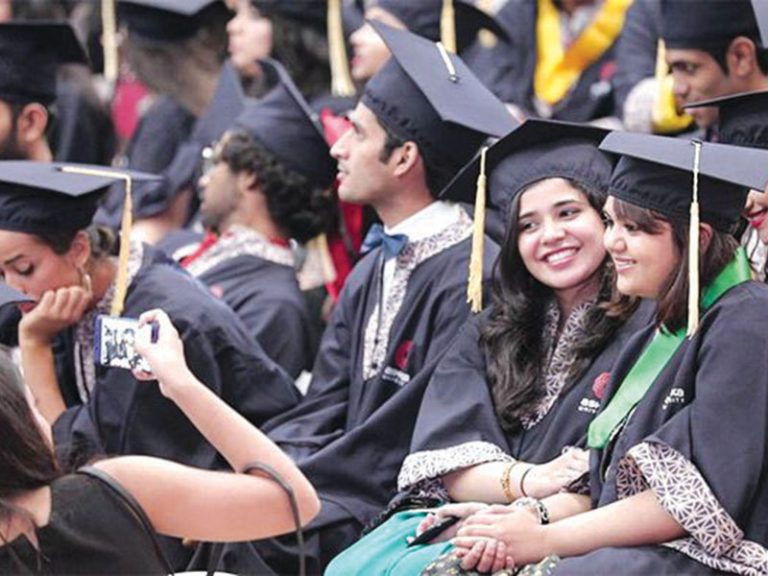Delhi: Research boost initiative
Autar Nehru (Delhi)

College graduates: research drive initiative. Inset: M. Jagadesh Kumar
The Delhi-based University Grants Commission (UGC) has greenlighted direct entry of graduates with four-year Bachelor (Hons) degrees into PhD programmes. On March 13, UGC gave formal approval to the UGC (Minimum Standards and Procedure for Award of PhD Degree) Regulations, 2022, enabling graduates of four-year undergrad programmes (FYUP) introduced by the National Education Policy (NEP) 2020, to sign up for doctorate programmes. In effect, the commission has eliminated the necessity of FYUP undergrads completing the Masters programme prior to signing up for research-intensive PhD programmes.
The objective of this relaxation is to “open up” opportunities for students to begin engaging with research and innovation at “very young age,” UGC chairman M. Jagadesh Kumar told news agency ANI (April 22) to attain a major mandate of NEP 2020 which is to strengthen the research ecosystem in Indian academia. “When we permit undergraduate students into PhD programs, you will have a lot of young people getting into research at a very young age, and they are really creative,” says Kumar.
However, admission of FYUP grads into PhD programmes comes with several riders. First, direct admission into PhD programmes of universities is open only to students who complete the four-year honours undergrad bachelors degree programmes of undergrad colleges (NEP 2020 permits earlier exits with certification). Moreover, aspirants should average a minimum 75 percent or equivalent grading in the four-year honours programme. Subsequently, candidates are obliged to clear the UGC-NET exam conducted by NTA (National Testing Agency) biannually (June and December) to be awarded Junior Research Fellowships and/or become eligible for the position of assistant professor in licensed universities.
Evidently, this initiative to prompt young graduates into research is driven by the common complaint that research and innovation is accorded inadequate importance by academia, government and industry. Countrywide, the allocation for research and development (R&D)aggregates a mere 1 percent of GDP cf.3.5 percent in the US, 4.8 percent in South Korea and 4-5 percent in OECD countries. Moreover, 66 percent of the annual national research outlay is expended by government in bureaucratic establishments such as the Soviet-inspired Council for Scientific & Industrial Research (CSIR) which 82 years after it was established, has precious little to show for its efforts.
India Inc’s R&D record is worse. It barely expends 0.50 percent of GDP on research and innovation and has earned an imitative, me-too reputation for reverse engineering and disrespect for patents and intellectual property worldwide (see edit p.16).
In the circumstances, the relaxation of norms for young graduates to qualify for research grants and junior professorships is welcomed by some academics who believe that the abolition last year of the M.Phil program — a bridge course between the Masters degree and PhD — and now the Masters degree, are steps in the right direction.
“Direct entry into PhD programmes is good for students with academic interests. But colleges need to prepare students for research and teaching by making the four-year undergrad programme more robust so that they develop the aptitude for research. Simultaneously, there is a pressing need to encourage research in universities rather than limit it to government organisations such as CSIR, DST, IISER and other government institutes. Research grants from industry, if not government, need to flow into universities to translate into commercial products and services,” says Prof. Sudhir Sopory, plant physiologist, scientist and former vice chancellor of JNU, Delhi.
“With the shorter path to a PhD, the number of PhD candidates will increase. While this democratisation of access may enhance the research community by offering fresh viewpoints, there’s also the possibility that research standards may be compromised if not supported with strict academic and administrative monitoring. The onus will be on colleges and universities to maintain strong evaluation standards to guarantee high quality of research papers and innovation,” warns Dr. G. Pardha Saradhi Varma, vice chancellor, KL Deemed University, Guntur.
Although there is considerable substance in these caveats warning against dilution of the Ph D degree, the plain truth is that thus far, the efforts of India’s sarkari and other research have failed to set the Ganges on fire. Therefore admitting younger graduates into research programmes and teaching at a time when universities are experiencing huge faculty shortages is an experiment worth trying. But even this experiment is unlikely to make meaningful impact without a mindset change and respect for knowledge creation in government and India Inc, which means they need to spend more on R&D.
Also read: UGC: 4-year bachelor’s degree holders with 75% marks can pursue PhD directly

















Add comment